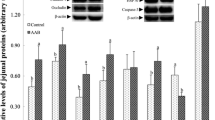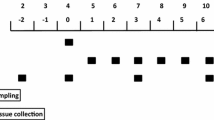Abstract
l-Leucine is a signaling amino acid in animal metabolism. It is unknown whether supplementing l-leucine to breast-fed neonates may enhance their small-intestinal development. This hypothesis was tested with a piglet model. Seven-day-old sow-reared pigs with an average birth weight of 1.45 kg were assigned randomly to the control or leucine group (n = 30/group). Piglets in the leucine group were orally administrated with 1.4 g l-leucine/kg body weight, whereas piglets in the control group received isonitrogenous l-alanine, twice daily for 14 days. The supplemental l-leucine amounted to 200 % of l-leucine intake from sow’s milk by 7-day-old pigs. At the end of the 2-week experiment, tissue samples were collected for determining intestinal morphology, expression of genes for intestinal leucine transporters (real-time RT-PCR and western blot analysis), and plasma metabolites and hormones. l-leucine administration increased (P < 0.05) villus height in the duodenum, an elevated ratio of villus height to crypt depth in the duodenum and ileum, plasma concentrations of leucine, glutamine and asparagine, as well as body-weight gains. mRNA levels for l-leucine transporters (SLC6A14, SLC6A19 and SLC7A9) and the abundance of the ATB0,+ protein were increased (P < 0.05) but those for SLC7A7 mRNA and the LAT2 protein were decreased (P < 0.05) in the jejunum of leucine-supplemented piglets, compared with the control. Plasma concentrations of ammonia, urea, triglycerides, and growth-related hormones did not differ between the control and leucine groups. Collectively, these results indicate that l-leucine supplementation improves intestinal development and whole-body growth in suckling piglets with a normal birth weight.



Similar content being viewed by others
Abbreviations
- AA:
-
Amino acids
- BCAA:
-
Branched-chain amino acids
- BW:
-
Body weight
- IGF-1:
-
Insulin-like growth factor 1
- mTOR:
-
Mammalian target of rapamycin
- RT-PCR:
-
Reverse-transcription polymerase chain reaction
References
Assaad H, Zhou L, Carroll RJ et al (2014) Rapid publication-ready MS-Word tables for one-way ANOVA. SpringerPlus 3:474
Chen L, Li P, Wang J et al (2009) Catabolism of nutritionally essential amino acids in developing porcine enterocytes. Amino Acids 37:143–152
Columbus DA, Fiorotto ML, Davis TA (2015) Leucine is a major regulator of muscle protein synthesis in neonates. Amino Acids 47:259–270
Dai ZL, Zhang J, Wu G et al (2010) Utilization of amino acids by bacteria from the pig small intestine. Amino Acids 39:1201–1215
Dai ZL, Wu ZL, Jia SC et al (2014) Analysis of amino acid composition in proteins of animal tissues and foods as pre-column o-phthaldialdehyde derivatives by HPLC with fluorescence detection. J Chromatogr B 964:116–127
Davis TA, Nguyen H, Garcia-Bravo R et al (1994) Amino acid composition in human milk. J Nutr 124:1126–1132
Davis TA, Suryawan A, Orellana RA et al (2010) Amino acids and insulin are regulators of muscle protein synthesis in neonatal pigs. Animal 4:1790–1796
Escobar J, Frank JW, Suryawan A et al (2006) Regulation of cardiac and skeletal muscle protein synthesis by individual branched-chain amino acids in neonatal pigs. Am J Physiol Endocrinol Metab 290:E612–E621
Haynes TE, Li P, Li XL et al (2009) l-Glutamine or L-alanyl-L-glutamine prevents oxidant- or endotoxin-induced death of neonatal enterocytes. Amino Acids 37:131–142
Kim SW, Wu G (2004) Dietary arginine supplementation enhances the growth of milk-fed young pigs. J Nutr 134:625–630
Lei XQ, Feng CP, Liu C et al (2011) Regulation of protein expression by l-arginine in endothelial cells. Front Biosci S3:655–661
Lei J, Feng D, Zhang Y et al (2013) Hormonal regulation of leucine catabolism in mammary epithelial cells. Amino Acids 45:531–541
Li F, Yin Y, Tan B et al (2011a) Leucine nutrition in animals and humans: mTOR signaling and beyond. Amino Acids 41:1185–1193
Li XL, Rezaei R, Li P et al (2011b) Composition of amino acids in feed ingredients for animal diets. Amino Acids 40:1159–1168
Newgard CB (2012) Interplay between lipids and branched-chain amino acids in development of insulin resistance. Cell Metab 15:606–614
Newsholme P, Cruzat V, Arfuso F et al (2014) Nutrient regulation of insulin secretion and action. J Endocrinol 221:R105–R120
Poncet N, Taylor PM (2013) The role of amino acid transporters in nutrition. Curr Opin Clin Nutr Metab Care 16:57–65
Rezaei R, Wang WW, Wu ZL et al (2013) Biochemical and physiological bases for utilization of dietary amino acids by young pigs. J Anim Sci Biotechnol 4:7
Rhoads JM, Wu G (2009) Glutamine, arginine, and leucine signaling in the intestine. Amino Acids 37:111–122
Rhoads JM, Niu XM, Surendran S et al (2008) Arginine stimulates cdx2-transformed intestinal epithelial cell migration via a mechanism requiring both nitric oxide and p70s6 k signaling. J Nutr 138:1652–1657
Suryawan A, Jeyapalan AS, Orellana RA et al (2008) Leucine stimulates protein synthesis in skeletal muscle of neonatal pigs by enhancing mTORC1 activation. Am J Physiol Endocrinol Metab 295:E868–E875
Suryawan A, Nguyen HV, Almonaci RD et al (2012) Differential regulation of protein synthesis in skeletal muscle and liver of neonatal pigs by leucine through an mTORC1-dependent pathway. J Anim Sci Biotechnol 3:3
Taylor PM (2014) Role of amino acid transporters in amino acid sensing. Am J Clin Nutr 99:223S–230S
Wang W, Zeng X, Mao X et al (2010) Optimal dietary true ileal digestible threonine for supporting the mucosal barrier in small intestine of weanling pigs. J Nutr 140:981–986
Wang WW, Dai ZL, Wu ZL et al (2014a) Glycine is a nutritionally essential amino acid for maximal growth of milk-fed young pigs. Amino Acids 46:2037–2045
Wang WW, Wu ZL, Lin G et al (2014b) Glycine stimulates protein synthesis and inhibits oxidative stress in pig small-intestinal epithelial cells. J Nutr 144:1540–1548
Wang H, Zhang C, Wu G et al (2015) Glutamine enhances tight-junction protein expression and modulates CRF signaling in the jejunum of weanling piglets. J Nutr 145:25–31
Wu G (2009) Amino acids: metabolism, functions, and nutrition. Amino Acids 37:1–17
Wu G (2013a) Amino acids: biochemistry and nutrition. CRC Press, Boca Raton
Wu GY (2013b) Functional amino acids in nutrition and health. Amino Acids 45:407–411
Wu G (2014) Dietary requirements of synthesizable amino acids by animals: a paradigm shift in protein nutrition. J Anim Sci Biotechnol 5:34
Wu GY, Knabe DA (1994) Free and protein-bound amino acids in sow’s colostrum and milk. J Nutr 124:415–424
Wu G, Meininger CJ (2008) Analysis of citrulline, arginine, and methylarginines using high-performance liquid chromatography. Methods Enzymol 440:177–189
Wu G, Meier SA, Knabe DA (1996) Dietary glutamine supplementation prevents jejunal atrophy in weaned pigs. J Nutr 126:2578–2584
Wu G, Flynn NE, Knabe DA (2000) Enhanced intestinal synthesis of polyamines from proline in cortisol-treated piglets. Am J Physiol Endocrinol Metab 279:E395–E402
Wu G, Knabe DA, Kim SW (2004) Arginine nutrition in neonatal pigs. J Nutr 134:2783S–2790S
Wu G, Wu ZL, Dai ZL et al (2013) Dietary requirements of “nutritionally nonessential amino acids” by animals and humans. Amino Acids 44:1107–1113
Wu GY, Bazer FW, Dai ZL et al (2014) Amino acid nutrition in animals: protein synthesis and beyond. Annu Rev Anim Biosci 2:387–417
Yin Y, Yao K, Liu Z et al (2010) Supplementing l-leucine to a low-protein diet increases tissue protein synthesis in weanling pigs. Amino Acids 39:1477–1486
Zabielski R, Godlewski MM, Guilloteau P (2008) Control of development of gastrointestinal system in neonates. J Physiol Pharmacol 59(Suppl 1):35–54
Zhang S, Qiao S, Ren M et al (2013) Supplementation with branched-chain amino acids to a low-protein diet regulates intestinal expression of amino acid and peptide transporters in weanling pigs. Amino Acids 45:1191–1205
Acknowledgments
This work was supported by the National Basic Research Program of China (No. 2013CB127302), the National Natural Science Foundation of China (No. 31172217, 31272450, 31272451), the Chinese Universities Scientific Fund (2013RC002), the Program for New Century Excellent Talents in University (NCET-12-0522), and the Program for Beijing Municipal Excellent Talents, the Agriculture and Food Research Initiative Competitive Grant from the USDA National Institute of Food and Agriculture (No. 2014-67015-21770), and Texas A&M AgriLife Research (H-8200).
Conflict of interest
The authors declare that they have no conflict of interest.
Ethics statement
The use of animals for this research was approved by the Institutional Animal Care and Use Committee of China Agricultural University.
Author information
Authors and Affiliations
Corresponding author
Rights and permissions
About this article
Cite this article
Sun, Y., Wu, Z., Li, W. et al. Dietary l-leucine supplementation enhances intestinal development in suckling piglets. Amino Acids 47, 1517–1525 (2015). https://doi.org/10.1007/s00726-015-1985-2
Received:
Accepted:
Published:
Issue Date:
DOI: https://doi.org/10.1007/s00726-015-1985-2




